Even before Senator Mitch McConnell’s announcement to step down from his long-held position as Senate Republican leader, Senator John Thune from South Dakota had already begun his campaign for the coveted role. This journey from the humble beginnings of Murdo, South Dakota, contrasts sharply with the opulent settings of Donald Trump’s Mar-a-Lago, yet it was this very background that shaped Thune’s determined approach to this pivotal leadership contest.
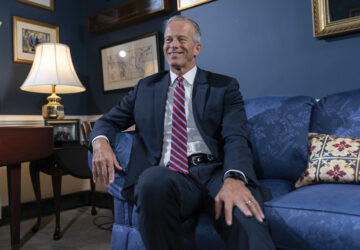 U.S. Senator John Thune in an interview, highlighting his Senate leadership aspirations and political career
U.S. Senator John Thune in an interview, highlighting his Senate leadership aspirations and political career
The upcoming secret ballot among Senate Republicans, scheduled after the November election, presents a significant crossroads. As the McConnell era concludes, the party faces a crucial decision: can a figure like John Thune, who embodies traditional Republican values and has occasionally diverged from Trump’s directives, ascend to leadership? This election will be a test of the evolving Republican landscape and the influence of different factions within the party.
Alongside John Thune, Senators John Cornyn of Texas and Rick Scott of Florida are also vying for the leadership position, with the possibility of other candidates joining the race. This competition underscores the diverse perspectives and priorities within the Republican Senate caucus as they look towards a post-McConnell future.
John Thune himself has openly acknowledged moments of introspection about his standing within the contemporary Republican Party. He has spoken about his internal debate before seeking re-election in 2022, despite a clear trajectory toward Senate leadership being within reach. This reveals a thoughtful politician considering his role in a rapidly changing political environment.
“You tire of just the day-to-day combat,” Thune confessed, reflecting on his deliberations. “I may not be best-suited to the times in terms of the style, the way I do things. But I just felt like the country was going to need some common-sense leadership, particularly if Sen. McConnell stepped aside.” This quote encapsulates Thune’s perspective on his leadership style and his motivations for seeking the top position.
This sentiment led to Thune’s visit to Mar-a-Lago, a symbolic gesture in the current Republican political climate. He hopes that this meeting, combined with his endorsement of Donald Trump for president, will foster a working relationship between them, should both secure their respective political goals. Navigating the relationship with Donald Trump is a key aspect of any Republican leader’s strategy in today’s political landscape.
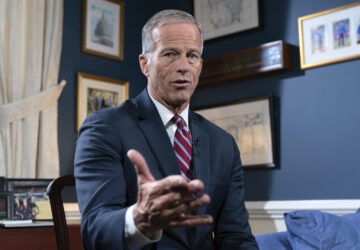 Senate Minority Whip John Thune discussing the future of Republican leadership and party strategy
Senate Minority Whip John Thune discussing the future of Republican leadership and party strategy
In an interview with The Associated Press, John Thune described his view of a potential relationship with Trump as “very professionally.” He stated that if both are successful in the upcoming elections, “then we’ve got a job to do.” This pragmatic approach emphasizes Thune’s focus on governance and collaboration, even with potentially complex political relationships.
“I think he understands where I’m coming from, so we’ll see what happens,” Thune remarked, adding a light chuckle, indicating a blend of optimism and realistic uncertainty about the future dynamics.
Throughout his career, John Thune has demonstrated a resilient and strategic approach to politics, reminiscent of an athlete’s mindset. His early mentorship with former South Dakota Senator James Abdnor laid the foundation for his political career. His ability to rebound from a Senate race defeat in 2002, ultimately unseating Senate Majority Leader Tom Daschle, and subsequently rising to the Senate whip position, highlights his political acumen and perseverance.
This year, Thune’s campaign for leadership mirrors his strategy as an 800-meter runner – taking an early, aggressive approach to outpace his competitors. His commitment of a substantial $4 million to the Senate GOP’s campaign efforts, coupled with extensive meetings with colleagues to secure support and nationwide travel to bolster Republican Senate campaigns, showcases his determined and well-funded campaign.
Navigating the Trump Influence: John Thune’s Delicate Balance
However, John Thune’s ambition for leadership requires him to walk a fine line: differentiating himself from Donald Trump’s political style while avoiding direct confrontations that have derailed other Republican careers. This balancing act is crucial for any Republican leader aiming to unite different wings of the party.
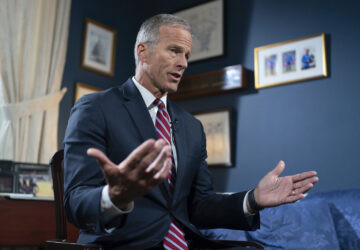 Senator Thune addressing questions about his relationship with Donald Trump and the future of the Republican Party
Senator Thune addressing questions about his relationship with Donald Trump and the future of the Republican Party
In late 2020, John Thune publicly criticized Trump’s attempts to overturn the election results, stating they would “go down like a shot dog” in the Senate. This candid rebuke prompted Trump to unsuccessfully attempt to recruit a primary challenger against Thune in 2022, demonstrating the tension between the two Republican figures.
Despite past disagreements, John Thune now asserts that Trump can be trusted with the presidency, while still acknowledging that the transfer of power “was hard, painful and tumultuous in many ways.” This nuanced stance reflects the complex dynamics within the Republican party and the need to bridge divides.
“I think with respect to democratic norms, my expectation is that he’s going to … follow them. He’s going to do things clearly his own way,” Thune commented on Trump’s potential future actions. This statement reflects a cautious optimism and an understanding of Trump’s unique political approach.
“Stylistically, it might not be the way I would do it or the way any other former president has done it. But in the end, the Constitution, the rule of law, governs this country. That’s our bedrock principle, and we can’t deviate from that,” Thune affirmed, emphasizing his commitment to institutional norms and the rule of law, even amidst stylistic differences.
The Competitive Spirit of John Thune: Rooted in South Dakota
Underneath his political persona, John Thune’s drive is deeply rooted in a fierce aversion to losing, a trait honed since his youth.
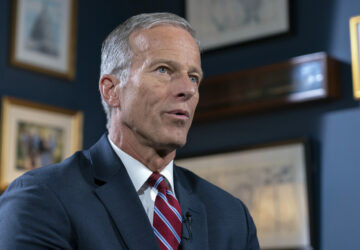 John Thune reflecting on his political journey and the competitive spirit he brings to Senate leadership race
John Thune reflecting on his political journey and the competitive spirit he brings to Senate leadership race
He still expresses visible disappointment when discussing his narrow 2002 Senate race loss by a mere 524 votes. This lingering sense of defeat underscores his deep-seated competitive nature.
He also recounts with emotion the consolation from his coach after a missed game-winning shot in high school basketball, highlighting the impact of both victories and defeats on his character. These formative experiences in sports have clearly shaped his approach to politics and leadership.
Basketball, a sport deeply connected to his family – his father played at the University of Minnesota – was where Thune’s competitive spirit truly emerged. “He would do whatever it took to win,” recalled Chris Venard, his high school basketball teammate, emphasizing Thune’s unwavering determination.
In Murdo, a small town in South Dakota, basketball games were central community events. His father, Harold, a teacher and basketball coach, played a significant role in developing his sons’ skills and instilled in them important values. Thune remembers a game where despite scoring 36 points, his father corrected him for not passing to an open teammate, teaching him about teamwork and balanced play.
“My first instinct was always: score,” Thune admitted, reflecting on his younger self. “A lot of times he would try and constrain that impulse.” This reveals a self-awareness and growth in his understanding of competition and leadership.
Faith and Values: Shaping John Thune’s Political Path
John Thune’s worldview is also deeply influenced by his evangelical Christian upbringing. He and his siblings attended Biola University, a Christian college, where these values were further reinforced. This faith background is a crucial element in understanding Thune’s motivations and principles.
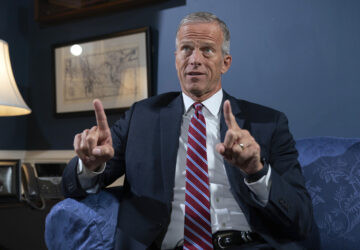 Senator John Thune discussing the values and principles that guide his political career and leadership style
Senator John Thune discussing the values and principles that guide his political career and leadership style
Thune credits these values for driving him to seek “a life of purpose” and to approach politics with “kindness and truth.” These principles underscore his commitment to a particular style of leadership rooted in ethical considerations.
Like many Republicans, the Thune family was drawn to the GOP by President Ronald Reagan and his advocacy for limited government. John Thune remembers casting his first vote for Reagan, admiring his “sense of humor, a lightness of spirit and a joyfulness.” Reagan’s political persona and ideology have clearly left a lasting impression on Thune’s political philosophy.
Colleagues, former staff, and friends consistently describe John Thune as a highly driven competitor who also values integrity, collaboration, and humility. These personal traits are seen as integral to his leadership style and political effectiveness.
“John is a first-class gentleman,” remarked former Senator Bill Nelson, highlighting Thune’s respected reputation across the aisle.
Connecting with Constituents: John Thune’s Approachable Style
At a South Dakota fairground, John Thune’s approachable and personable style was evident. His ability to connect with people was a key factor in Republican Senate colleagues encouraging him to consider a presidential run in 2012.
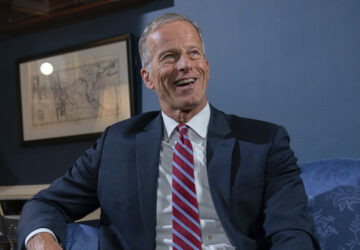 Senator John Thune engaging with constituents in South Dakota, showcasing his approachable political style
Senator John Thune engaging with constituents in South Dakota, showcasing his approachable political style
Known for his lean physique and genuine smile, Thune effortlessly engaged with constituents, recalling names, sharing handshakes, and displaying a comfortable, down-to-earth demeanor. This ability to connect personally with voters is a significant asset in his political career.
However, the Republican Party has evolved since 2012. During a meeting with a Sioux Falls volunteer club, a voter directly challenged Thune, asking, “What are you doing to get Trump back in the White House?” This encounter reflects the current priorities and expectations of a segment of the Republican base.
As elections draw closer and the Senate leadership race intensifies, John Thune is channeling the mindset of an 800-meter runner in the final stretch. His campaign is entering a critical phase as he seeks to secure the leadership of the Republican party.
“It’s a brutal race,” he acknowledged, referring to both the election cycle and the leadership contest. “But you’ve got to gut it out.” This concluding remark encapsulates John Thune’s determined approach as he navigates the challenges and opportunities ahead in his quest for Senate leadership.

